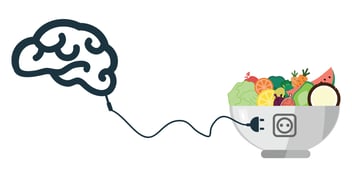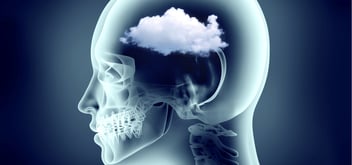What is Brain Fog? Symptoms, Nutrition’s Role and Interventions
- Home
- Blog

What You Will Learn in this Blog:
- The symptoms of brain fog and its impacts on mental health
- The role nutrition plays in brain fog
- How you can fight brain fog and regain a clear mind through diet and lifestyle interventions
Reader, have you ever felt a distinct fuzziness to your thought processes—as if you can’t concentrate on a single stream of thought for too long without losing the thread? As if your brain just isn’t working like it used to? Or perhaps your brain just feels kind of numb, incapable of remembering or making important decisions, not to mention organizing your thought processes. Sometimes, this feeling can last for days. Other times, it can last for months, or even years.
If this sounds familiar, you may be experiencing brain fog.
Taking a step back, let’s look at what brain fog means. While brain fog isn’t a medical term, we often hear patients experiencing it report:
- “I don’t feel as smart as I used to be, it takes longer for me to do tasks, I get lost in thought and am easily distracted and I don’t have that same edge anymore.”
- “I feel detached from my work and unmotivated to take care of all the details of my life like I used to.”
- “When I am driving, I no longer feel comfortable with my sense of direction or my ability to make good decisions, I use my navigation app to go everywhere.”
- “I am not myself! I forget appointments, I can’t multitask all the family and work demands that I used to handle with ease.”
- “I think I might have early Alzheimer’s, I can’t keep track of my keys and lose my train of thought mid-sentence.”
Our ability to think clearly is at the center of our ability to be successful in life. When brain fog shows up, it can be very difficult to do the things that we need to for our families, ourselves, our coworkers. Therefore, if you suffer from brain fog, you may experience severe stress as a direct result of your brain fog which takes its own toll on how well our brain can work, setting up a negative cycle.
Unfortunately, symptoms of brain fog can be hard to pin down or “diagnose,” leading to ongoing suffering or feelings that this is just the way our brains feel now and there’s nothing we can do about it. In fact, this could not be further from the truth. It can be fixed, and we’re here to tell you how.
What are the Possible Root Causes of Brain Fog? How Can I Fix It?
Brain fog is a very common symptom that can be caused by many different physical conditions. In fact, brain fog is listed as a possible symptom for almost all chronic diseases including diabetes, heart disease, anxiety, depression, chronic lyme disease, and even mold exposure toxicity. Brain fog can be a result of insufficient nutrient intake, toxic exposures, COVID-19, food sensitivities, impaired gut health, and hormonal changes (including menopause and pregnancy).
If you suffer from brain fog, it can be extremely difficult to figure out what is causing it let alone how to fix it. In this blog, we will discuss what the term “brain fog” really means, and how nutritional psychiatry can help you diagnose and resolve your symptoms once and for all.
Finding the root causes behind symptoms is foundational to how nutritional psychiatry operates because until we resolve the underlying drivers, all our approaches will be temporary fixes if not downright ineffective. In order to provide personalized nutrition care, we must take a multi-pronged approach that includes a detailed history and targeted testing in order to rule in and out different likely causes.
In the interim of making a personalized assessment as to the underlying causes, we can start by optimizing the five nutritional psychiatry pillars
- Diet
- Movement
- Stress Management
- Sleep
- Social Connections
Foods that Fight Brain Fog
So much of how we feel is dictated by what we do or do not eat. Your overall approach to eating, the specific foods you choose and avoid, and the nutrient density of your diet all set the stage for how your brain works.
A 2019 review article titled Nutritional Psychiatry: towards improving mental health by changing what you eat notes “A high-quality diet may… help to regulate the gut microbiota and reduce stress and inflammation in the brain and subsequently maintain proper cognitive function throughout life.”
With that in mind, at Potomac Psychiatry there are three key areas that we focus on for brain health:
- Fighting Inflammation: Selecting foods that are nutrient-dense gives your cells the building blocks they need in order to work their best—and that includes the cells in your brain called neurons. However, it’s just as important to avoid foods that cause inflammation due to their high refined sugar content, or their levels of oxidized fats or artificial flavors and colors. Shifting towards meals including colorful fruits and vegetables, as well as healthy fats and clean protein, creates an inflammation-fighting diet that supports your cells and allows them to work optimally.
- Assessing Food Sensitivities: Many patients experience brain fog as a result of eating food that might otherwise be healthy but is something that their immune system is reacting to—which in turn triggers inflammation. These food sensitivities can be difficult to assess. Fortunately, we have a few tools that can help. We can use a finger prick test called KBMO Fit to help understand which foods are causing an inflammatory response, and we can also oversee an elimination diet that removes the most common food triggers and slowly reintroduces them to determine which foods are not well tolerated. Luckily, most food sensitivities can be resolved with temporary elimination and strategic gut healing.
- Feeding Your Microbiome: A disruption in the number and type of beneficial microbes that reside in your gut can directly impact brain function which leads to brain fog and other mental health concerns such as depression and anxiety. The collection of beneficial microbes is called your microbiome and it plays a critical role in your overall health as well as your brain health. Many of our health habits directly impact our gut microbiome due to a gut-brain superhighway, called the Vagus Nerve; therefore, anything that impacts our gut impacts our brain. Higher levels of nutrients, colorful plant foods, high fiber intake, and healthy fats are associated with healthier gut microbiomes and lower levels of mood disorders such as depression and anxiety which are a common cause of brain fog.
Fixing Brain Fog through Movement
We evolved to be physically active as part of our basic ability to survive the rugged terrain of pre-modern times. However, according to the 2018 National Health Interview Survey, only 23% of Americans meet the CDC’s recommended amount of aerobic and muscle-strengthening exercise—yet we know from research that there is a direct link between exercise and our brain’s ability to grow and change, called neuroplasticity.
The mismatch between our modern lifestyle and the fundamental way our bodies have evolved makes us susceptible to inflammation, which can in turn show up as brain fog for many people. Movement is defined as both intentional activities such as exercise as well as activity that is part of daily living such as yard work. Movement influences our gut microbiome, our stress response, our sleep patterns, and the overall level of inflammation in our body, and it’s a critical aspect of improving all the possible causes of brain fog!
Reducing Stress to Reduce Brain Fog
Recent research clarifies the impact of pro-inflammatory dietary patterns on our ability to mount a healthy stress response, showing us that diets that are high in fat, sugar, and salt increase the impact of stress, particularly on cognitive ability. Poor food choices impact our cognitive ability, specifically our verbal memory and attention—which is how many people describe brain fog.
As you get off the stress roller coaster and find better balance in your nervous system, your brain can work more efficiently. This can mean changing certain aspects of what you eat and drink, incorporating breathing or yoga, and taking steps to mitigate the stress that you have.
Getting a Good Night’s Rest for your Brain
Sleep is a critical element of health, and while we might not know everything about it, we know enough to know that it’s the road through which health travels. During sleep, a deep cleaning process happens in our brain that cannot happen otherwise. There’s a direct connection between length and quality of sleep and cognitive function.
A 2015 study linked chronic sleep disturbance with “impaired cognition, diminished intellect, poor memory, confusion, and psychomotor retardation all of which may be misinterpreted as dementia.”
Thus, a key to beating brain fog must include an assessment of your sleep. Specific foods can get in the way of healthy sleep while others make it all the more likely.
Social Connections Help Fight Brain Fog
The fact that we are social creatures has been written into the very fabric of our biological design over the course of our evolution—so much so that reported feelings of loneliness increase the risk for developing Alzheimer’s disease by more than double. Your brain is literally programmed for connection in a way that the lack thereof creates dysfunction which can show up as brain fog.
Given our increasingly isolated and remote world, making specific efforts to connect with people, animals, and even plants sends our nervous system a clear message that we have a tribe, and all is well.
Potomac Psychiatry Can Help You Fight Brain Fog
If you resonated with this post, I hope you will reach out to the experts at Potomac Psychiatry to get help for your brain fog symptoms and learn about our nutritional psychiatry programs.
Your brain doesn’t have to feel fuzzy and fatigued. With our help, you can regain your sense of self, and a sense of clear-mindedness that can empower you to live your best life.
.png?width=144&height=144&name=Untitled%20design%20(34).png)



